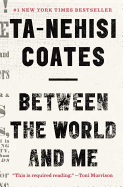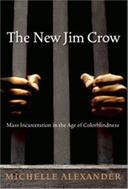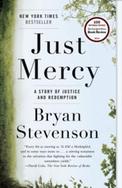 Ta Nehisi-Coates wrote Between the World and Me as a powerful letter to his son, reflecting on what it means to live--and to face dying--as a black man in the United States today. Coates acknowledges and addresses the tribulations without shying away from hard truths. "I would have you be a conscious citizen of this terrible and beautiful world," he writes--and acknowledging the truths in this National Book Award winner is an important first step in that consciousness.
Ta Nehisi-Coates wrote Between the World and Me as a powerful letter to his son, reflecting on what it means to live--and to face dying--as a black man in the United States today. Coates acknowledges and addresses the tribulations without shying away from hard truths. "I would have you be a conscious citizen of this terrible and beautiful world," he writes--and acknowledging the truths in this National Book Award winner is an important first step in that consciousness.
 Recognizing the many flaws in the country's criminal justice system is crucial to continuing on the path to conscious citizenship. Michelle Alexander's 2010 book The New Jim Crow addresses the systemic racism of the United States justice system, drawing parallels between the Jim Crow laws of the late 19th and early 20th century and the War on Drugs that grew up after the collapse of Jim Crow in the 1960s. Importantly, Alexander's study addresses not only the causes of incarceration, but the lasting impact of a criminal record on an individual's life. Those interested in a deeper dive into the history of the War on Drugs--and the ways it has been played out not just in the U.S., but across the globe--will be interested in Johann Hari's Chasing the Scream.
Recognizing the many flaws in the country's criminal justice system is crucial to continuing on the path to conscious citizenship. Michelle Alexander's 2010 book The New Jim Crow addresses the systemic racism of the United States justice system, drawing parallels between the Jim Crow laws of the late 19th and early 20th century and the War on Drugs that grew up after the collapse of Jim Crow in the 1960s. Importantly, Alexander's study addresses not only the causes of incarceration, but the lasting impact of a criminal record on an individual's life. Those interested in a deeper dive into the history of the War on Drugs--and the ways it has been played out not just in the U.S., but across the globe--will be interested in Johann Hari's Chasing the Scream.
 Bryan Stevenson, a lawyer working with inmates on death row, writes about his experience in Just Mercy, and about the many ways it has prompted him to be merciful in his judgment of others. This mercy, he argues, is the only way to elevate the broken among us--and to elevate ourselves, as well: "Simply punishing the broken--walking away from them or hiding them from sight--only ensures that they remain broken and we do, too. There is no wholeness outside of our reciprocal humanity." --Kerry McHugh, blogger at Entomology of a Bookworm
Bryan Stevenson, a lawyer working with inmates on death row, writes about his experience in Just Mercy, and about the many ways it has prompted him to be merciful in his judgment of others. This mercy, he argues, is the only way to elevate the broken among us--and to elevate ourselves, as well: "Simply punishing the broken--walking away from them or hiding them from sight--only ensures that they remain broken and we do, too. There is no wholeness outside of our reciprocal humanity." --Kerry McHugh, blogger at Entomology of a Bookworm

